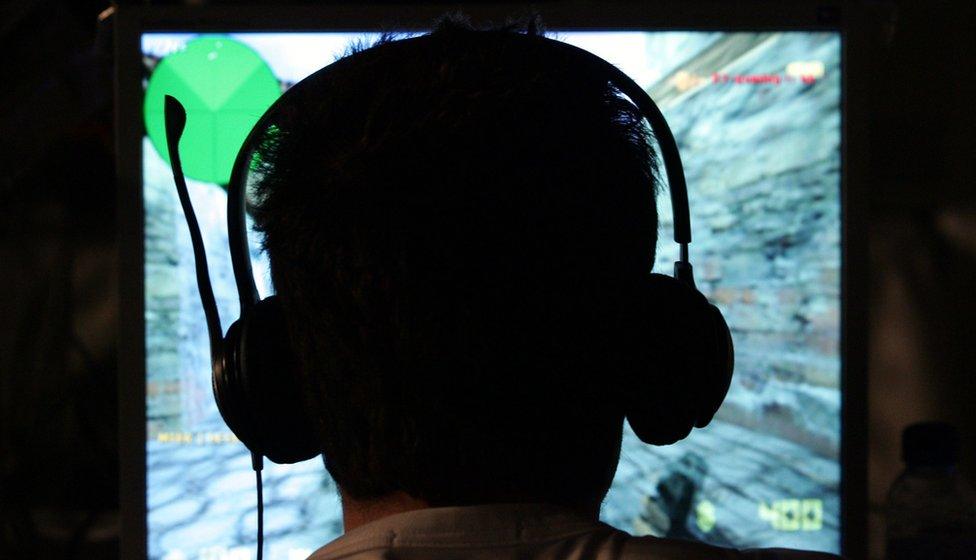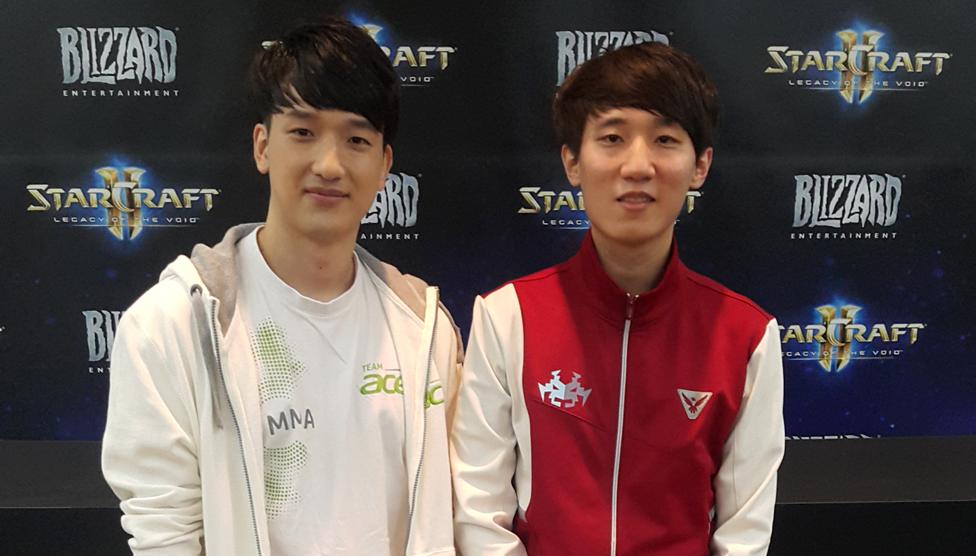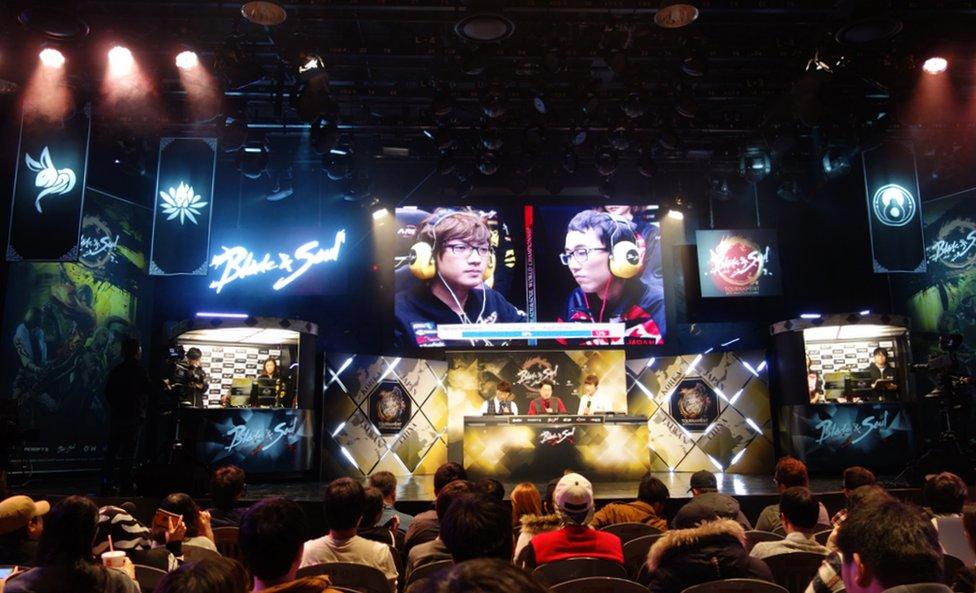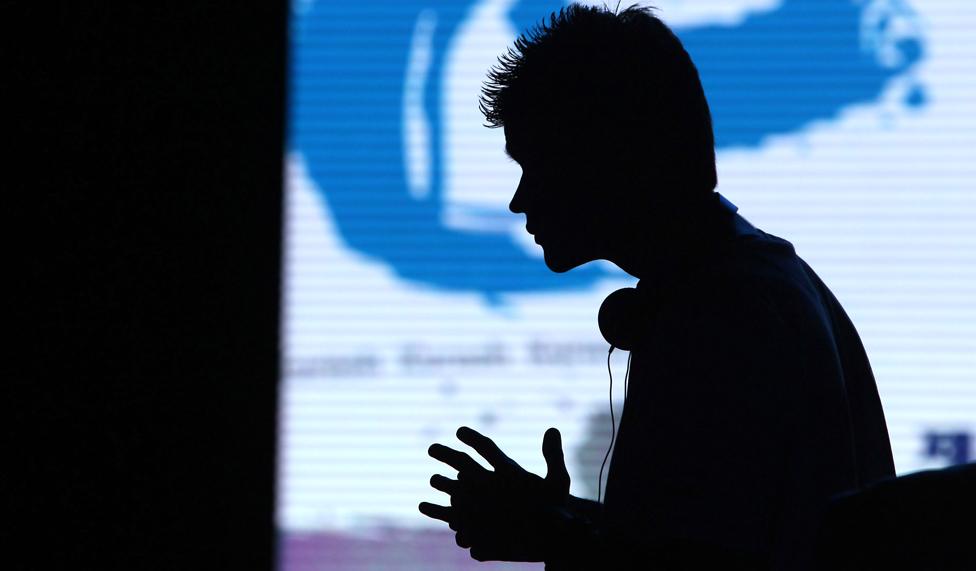Making a fortune - just by playing games
- Published

It's a common worry among parents - the amount of time children spend playing computer games. But those endless hours in front of a screen have paid off for some who have become celebrity gamers competing for huge prizes.
You know a sport has arrived big time when 120,000 people gather to watch a competition. Or when TV channels are devoted only to televising games in professional leagues. Or when the top prizes run into the millions of dollars. Or perhaps when match-fixing scandals erupt around big events.
Welcome to e-sports, which may now be the Korean national game. In South Korea, there was once a moral panic as adults feared a generation was about to waste its time in front of screens but that seems to be fading. Instead, all the signs are of growth and increasing professionalisation.
The recent launch of the latest iteration of StarCraft took place in Gangnam in Seoul with all the trappings of a big, minutely choreographed Hollywood event, complete with red carpet for TV interviews with celebrities and a staged wedding of one of the game's stars to celebrate his recent marriage.
These stars lead a sedentary life of high excitement, split between adulation in public and private introspective practice in front of a screen, making money through lightning-speed twitches of fingers and a strategic brain that plans like a general.

Won Mun Seong (left) and Ji Sung Choi (right)
"Normally I practice for 10 to 12 hours a day," says one of them, Won Mun Seong, who goes by the name MMA. "A pro gamer gets up late, about 10am, and after breakfast, practice from 11am to 5pm and then dinner and then more practice until 10pm. Then I have a break and practice until 2am. Then bed. All day long: practice."
He is 28 and has a girlfriend who he says understands his hours and the demands on him.
Another star, Ji Sung Choi, known as Bomber, has a similar schedule: "I wake up 10am and then breakfast and practice until 5pm and dinner - 5pm to 7pm is free time. And then night practice until midnight and then free time so I go to bed at 3am."
He's a football fan and follows the English Premier League avidly. He hopes competition in StarCraft will be just as big one day: "E-sports is in an emerging stage - later, when it gets bigger, it will be like major sports like football, basketball or baseball."
The players say they can get prizes of $250,000 (£165,000) plus sponsorship, taking their earnings to levels they never dreamed of, and their parents never dreamed of when they worried their offspring were wasting their learning years. "When I was young and playing games, my parents would take away my computer or break it but now my parents support me - they give me snacks and fruit when I practice," says Ji Sung Choi.
Both are in their late 20s and see younger players coming up. In StarCraft (as in all the games) speed of brain and finger is the essence so, like footballers, they don't see much professional future as players beyond the age of 30.

A competition in a Korean shopping mall on a Saturday afternoon
There is increasingly money to be made in the industries that surround e-sports, like television. Nick Plott (aka Tasteless) is a commentator, originally from Kansas in the US but now in Seoul making a good living as a commentator. "My job basically entails me dissecting the game and making something that is consumable for a regular viewer, so we talk about the strategies but we try to do that without too much gamer terminology and we also try to connect with our viewers," he says.
"Most of our viewers are between the ages of 15 and 32 so we try to incorporate a lot of humour with nerd culture and talk about other games - but we are basically entertainers."
Commentator Nick Plott aka Tasteless: "It's not a matter of if e-sports will be in the Olympics but when."
His colleague Dan Stemkoski (aka Artosis) is also an American who commentates in South Korea. He moved to be where the demand is greatest and says the idea that playing video games is a waste of time is fading: "My parents definitely felt that way when I was practising so hard every day but I think that when you look at it now, it is something that can be much more accepted. It is becoming more respected, it is becoming more professional and mapped out."
And he thinks it definitely isn't for slobs: "You have to stay physically fit. You need to try to exercise your mind or you are going to burn out, you need to be very creative about this, you need to talk to other people, you can't do this in a vacuum."
Over the years there has been a moral panic about gaming in South Korea. In 2011, the government instituted the so-called "shutdown law" or "Cinderella law", whereby children under the age of 16 are banned from playing between midnight and 06:00.
But the law hasn't impeded the growth of the industry and Seoul's e-sports industry is thriving.

StarCraft is a real-time strategy game that involves controlling units on a map to defeat opponents


The game is not turn-based so players must move as quickly as possible
There have always been killjoys who've got themselves into tizzies over games. In 1942, Mayor LaGuardia of New York personally took a sledgehammer to pinball machines. The games were banned in the city until 1976.
Even chess has had its critics. In the Scientific American of 2 July 1859, under the headline "Chess-playing excitement", an article bemoaned that "a pernicious excitement to learn and play chess has spread all over the country". This was deplorable because "chess is a mere amusement of a very inferior character, which robs the mind of valuable time that might be devoted to nobler acquirements, while at the same time it affords no benefit whatever to the body".
The outraged author continues in full indignant flow: "Persons engaged in sedentary occupations should never practice this cheerless game; they require outdoor exercises for recreation - not [this] sort of mental gladiatorship."
Change the word "chess" to "video games" and you might get the same outraged sense of moral panic. That feeling is no longer associated with chess - it is a byword for virtue.
Will the same be true of e-sports?

Find out more

Top e-sports players can earn upwards of £1m ($1.5) a year and they are like traditional sportspeople in many ways. They compete as part of slickly-operated teams which take part in regional leagues. They study strategy, technique, the opposition.

Subscribe to the BBC News Magazine's email newsletter to get articles sent to your inbox.